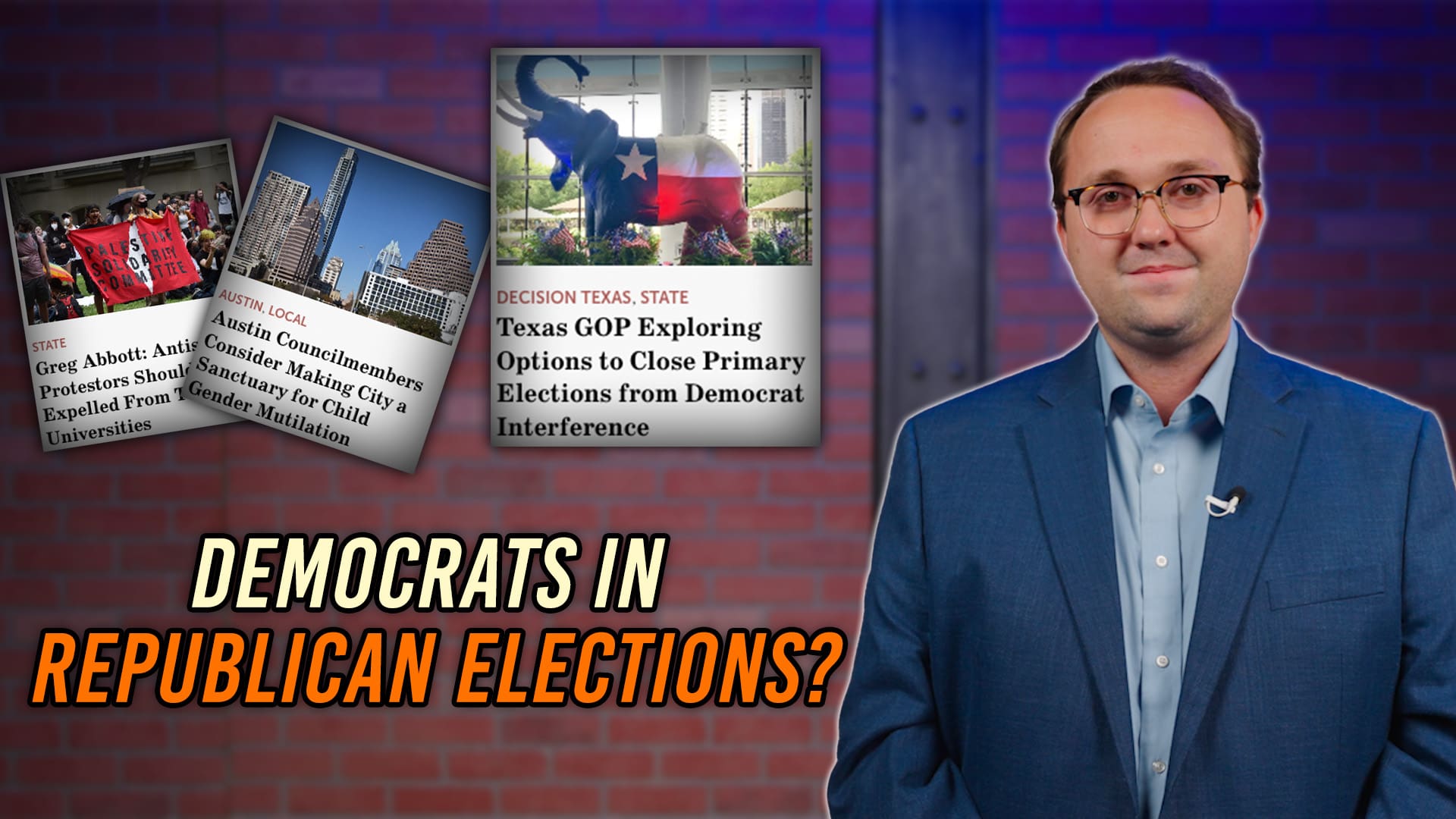This past weekend, media personality Chad Prather, former Texas GOP Chairman Allen West, and former State Sen. Don Huffines once again met onstage to share their ideas and platforms with voters.
Gov. Greg Abbott continued his streak of avoiding such forums and did not attend.
At a forum hosted by Grassroots America – We The People in Tyler, conservative grassroots activist and GAWTP Executive Director JoAnn Fleming moderated the event, covering topics like the Texas National Guard and DPS on the border, private land annexation, and judicial vacancies and their proper fulfillment.
Texas’ Southern Border
Candidates were asked how their leadership of the Texas Military Department and the Texas National Guard would meet the challenges of listening to the issues of the soldiers on the ground and still expecting the organization to do its job and protect Texans.
West championed leadership by example, referencing his time serving in the Army in combat zones.
“As the commander-in-chief of the Texas Military Department, I would be down there with the people because I don’t believe that anyone should ask people to do something that they’re not willing to do themselves, which means you get out there and you see what is going on with those troops, you make sure that they have the ammunition, you make sure that they have the equipment, you make sure that they have the right mission, the task, and purpose,” said West. “You make sure that they have the right rules of engagement. There is no way that as the commander-in-chief of the Texas Military Department that I would tell any young man or young woman down there on that border, ‘If you’re fired upon, you can’t fire back.’”
“Furthermore,” West added, “you have to hold people responsible and accountable. The fact that we have had members of our Texas National Guard since the month of November committing suicide—they’re not deployed to Iraq, they’re not deployed to Afghanistan, they’re right here in Texas and they’re committing suicide—that tells me that something is wrong with the command climate in the Texas Military Department. And you start at the top, and you start to get rid of people until you find someone that understands that philosophy of leading from the front.”
After expressing his thankfulness for those who choose to serve in the capacity of law enforcement, Prather said, “Right now there is no chain of command, there is no clear mission, [there are] no clear marching orders.”
“[W]e’re seeing a lot of problems in the ranks. We’re seeing huge outbreaks of COVID, we’re seeing bad living conditions, payroll issues, we’re seeing suicides that are happening. … And at some point in time, folks, we’ve got to go down there and empower those who are there to protect you,” said Prather.
Refusing to bow down to the “political theater” that Gov. Greg Abbott has turned Operation Lone Star, the DPS, and the Texas National Guard into, Prather defended them, stating, “They’re not a photo op. Greg Abbott keeps putting them out there as a photo op. We’ve seen these DPS; they’re not in riot gear, they’re in bad formation, they don’t have deployment patches on their shoulders. This is a situation that has to end. We’re not putting these men and women down there for the purpose of sacrifice in order to have a political photo op. We’ve got to stand with them and let them do their jobs.”
Huffines spoke of his time in the Texas Senate as a member of the Committee for Border Security, and he also acknowledged that there is a lot of political theater involved in the current approach to border security.
“Imagine today if you’re in the National Guard you want to serve,” said Huffines, “and the governor calls you up at the spur of the moment. You’re leaving your family, you’re leaving your job, and you’re going down to the border to be a crossing guard. No wonder we’ve had suicides—four or five suicides—down there in the last 60 days. The morale is horrible.”
“As governor, I would never do that. I would be down there with the troops, and I can tell you I will give them a defined mission, a defined mission that’s going to end in 30 or 60 days so they can go on home. Without a defined mission, of course everybody’s going to have bad morale. Another thing to keep in mind is that we do not have our own ammunition anymore. Our heavy armaments are stored at the federal forts; now, the federal government’s got control over all that. I tell you when I say I’m going to stop the invasion on the border, I’m not asking permission from the federal government. I’m going to get that ammunition back, so we’re going to treat this like it is an invasion, and that’s the rules of engagement—to stop the invasion. And I’m never asking permission from the federal government,” said Huffines.
Private Land Annexation
Although Texas has made strides toward protecting private property from the state and local governments, the Biden-Harris administration launched the America the Beautiful Initiative, which seeks to conserve 30 percent of U.S. land and water by 2030. Candidates were asked how they would tackle federal overreach into private property.
Prather’s plan involves removing government from people’s lives by turning Texas into a Constitutional sanctuary state, focusing on self-governance.
“If it doesn’t fit into the Constitution, then it doesn’t do business here on the soil of Texas. We have the size, leverage, the ability, the economy, and the people that can push back against the federal government [and] make sure that these types of things that are overreach in our lives are not a reality in the state of Texas,” said Prather.
“It’s time for us to take back the things that we’re known for: our wealth, our land, our posterity, our legacy. I want every one of you in this room to be J.R. Ewing, and it ain’t going to happen as long as a guy like Joe Biden is reaching into your life. We gotta make that change and stop it.”
Citing his record as a co-author of the original legislation to stop annexation abuse, Huffines discussed how the federal government has used clauses of the Constitution to expand their overreach.
“The federal government is on the move. You know, you don’t even control your own ditches, your own ponds on your own land; the federal government controls that with the Clean Water Act. And the way they got into that was if a bird flew over the state line and the interstate commerce act and landed in your pond, they decided they’ve got jurisdiction,” said Huffines.
“The federal government controls your ranch, your land. And the best thing we can do is to make sure that we use the 10th Amendment or nullification law. I’m never asking permission from the federal government. I’m specifically never going to enforce their laws for them.”
West laid the philosophical framework for private property.
“In 1689, English political philosopher John Locke introduced a theory called natural rights, and there were three components to the natural rights theory: life, liberty, and property. Those are natural rights that come to you from your creator,” explained West. “They don’t come to you from the government, and that’s the most important thing we have to understand … we’re supposed to be protecting your life, your liberty, and your property, and we cannot continue to allow [the] federal government or any government to come and believe that they can bribe you into losing your property.”
Citing his congressional record of fighting the Environmental Protection Agency, West said, “The most important thing we have to do is re-establish the sovereignty of the state so that the federal government understands Article 1, Section 8 of the [Constitution]. … In the Constitution, 16 to 18 things are the duties and responsibilities of the federal government; outside of that, it all comes back to the state, and we’re going to reassert that.”
Fulfilling Judicial Vacancies
Oftentimes, members of the judicial branch will time their resignations or retirements to allow the governor to fill the empty seat, rather than the voters. Some have pointed to this phenomenon as part of the reason that state courts have been hesitant to challenge the governor’s authority. Candidates were asked for their solutions.
Huffines suggested term limits, citing his record of filing legislation to enact term limits while he was a state senator.
“I want term limits from the governor to the dog catcher. There’s got to be an end to this game of everybody being in the political space. I do not think career politicians serve Texas—this includes our judges. My bill was drafted such that judges could serve 12 years and that was it, they had to leave the bench,” said Huffines, promising to call a special election to fill any resignation vacancies.
West also supports term limits because “we’re finding that we’re having more activist judges than truly people that want to interpret the law.” According to West, Article 15, Section 8 of the Texas Constitution allows the governor to begin impeachment proceedings on judges. West suggests utilizing that option, citing the actions of judges in Harris County who release “violent criminals back on the streets that are killing Texans.”
“The most important thing is that you need to be the ones that are selecting your judges, and we should not be playing the political games and gimmicks of timing it so that the governor can appoint people. So, we need to have term limits. I’m a full supporter of term limits, and we [have] got to make sure that we have judges that interpret the law that are not judicial activists,” stated West.
Prather supported term limits but also suggested that Texas needs prerequisites for how judicial appointments are made. “Here’s a novel idea: Let’s put the power back in the hands of the people. Let’s make sure that you’re choosing your judges. Let’s make sure that you’re keeping your judges accountable. An odd idea, right? That we would have delegated authority [to] representatives who were put there by us, controlled by us, and again are held accountable by us, by we the people?”
“These ideologies are being put into our lives in such a way that we know that it’s affecting all [of] you. All you [have] got to do is look at the headlines across the state of Texas. … It’s happening because of these judges, whether it’s masks, quarantines, distancing, shutdowns, deeming people essential or non-essential—these are the people who are enforcing it, and we’ve got to make sure those appointments are held accountable,” said Prather.
The full video of the forum can be found here.
Early voting begins on February 14. Election Day is March 1.




